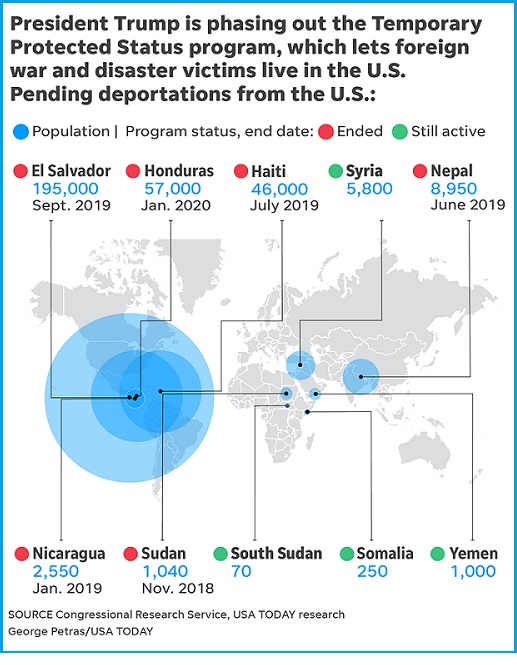
|
|

|
|
| April 20, 2024 |
|
Trump administration gives 57,000 Hondurans 18 months to leave U.S. 
WASHINGTON--The Trump administration on Friday ended a special immigration program for 57,000 Hondurans who have legally lived and worked in the U.S. for two decades, giving them 18 months to leave the country.
The announcement is the latest step by the administration to phase out Temporary Protected Status (TPS), which is granted to foreign nationals whose countries are decimated by hurricanes, earthquakes and civil wars. By cutting off TPS for Hondurans, the administration has now ended the program for 98% of the roughly 317,000 immigrants from six countries who had been legally residing in the U.S., some for nearly 30 years. Honduras was first granted TPS in 1999 after Hurricane Mitch devastated the Central American nation. The Department of Homeland Security concluded that conditions in Honduras have improved to the point that the country is ready to absorb the return of tens of thousands of citizens. The Honduran Embassy and supporters argue the country has been besieged by gang violence and drug cartels, which is already prompting tens of thousands of Hondurans to flee north to find refuge in the U.S. Adding so many more people, they say, will only make matters worse. On Friday, officials from Amnesty International, Catholic Relief Services, and even some Republican lawmakers, railed against the administration's decision. Rep. Ileana Ros-Lehtinen, R-Fla., whose South Florida district includes many Honduran TPS holders, called Friday's termination "wrongheaded" and "tragic." "Forcing their return to a country that is wracked by endemic violence and poverty will put their lives in danger, separate families, and have devastating effects on communities both in Honduras and the United States," said Sister Patricia McDermott, president of the Sisters of Mercy of the Americas. Hondurans who had benefited from the program must now decide by January 2020 whether to return to their home countries, or remain in the U.S. as undocumented immigrants. Complicating that decision is the fact that those Hondurans have given birth to about 53,500 children, all U.S. citizens, according to estimates from the Center for American Progress. Parents will have to decide whether to take their children to a country they've never known, leave them behind in the U.S., or stay as a unit in the U.S. constantly at risk of deportation. Losing Hondurans with work permits will also cost the U.S. about $31 billion over 10 years, according to the Center for American Progress. Temporary Protected Status was created by Congress in 1990 to allow people from countries hit by natural disasters or armed conflicts to legally live in America while their home countries recover. Haitians qualified for the status after the 2010 earthquake, Central American countries qualified after Hurricane Mitch ravaged several nations there in 1998, and people from Sudan qualified in 1997 after civil war overwhelmed their country. Republican and Democratic presidents have extended these protections, concluding that each of the countries on the list had not recovered enough to absorb tens of thousands more residents. The Trump administration has taken a different approach, arguing that the program has been extended too many times and that conditions have improved enough in each country to end the emergency designations. One by one, the administration has ended TPS for Nicaraguans, Sudanese, Haitians, Salvadorans and Hondurans. It also ended a similar program for about 745 Liberians last month. The president's supporters have cheered each decision by repeating a common phrase: "T" is for "temporary." In a White House speech this month, Department of Homeland Security Secretary Kirstjen Nielsen said it's time to wind down the program. "We ended so-called temporary immigration programs that were either constitutionally dubious or were administered in a manner that was inconsistent with the purpose of the law or contrary to the intent of Congress," she said. Dan Stein, president of the Federation for American Immigration Reform, a group that advocates for lower levels of legal and illegal immigration, said poor conditions in TPS countries does not mean their citizens should be able to stay in the U.S. forever. "Twenty years is enough time for any country to return to some semblance of normalcy after a natural disaster," he said. "Normal does not mean ideal. Honduras, like many other nations that have received TPS designation, was gripped by poverty and turmoil before it was struck by Hurricane Mitch in 1998. There is no reason to believe that these longstanding problems would be solved by another extension of TPS." Defenders of the program say that cold calculation may be accurate, but it ignores the hundreds of thousands of families who will be devastated if they must leave the U.S. They argue that it would've been understandable to end the TPS designations after two or three years but that it's cruel to do so after 20 or 30 years. (Source: USA Today) Story Date: May 6, 2018
|